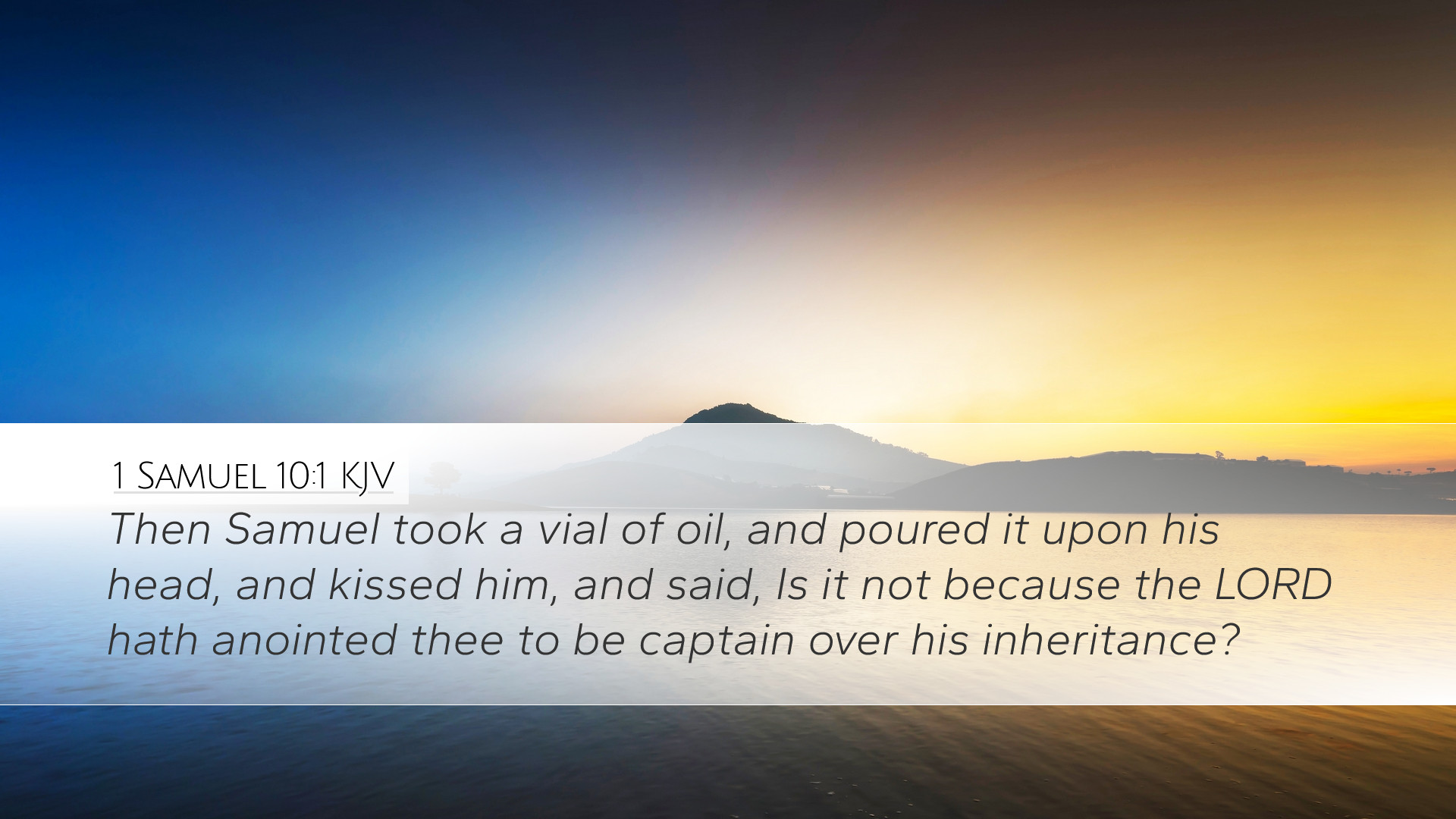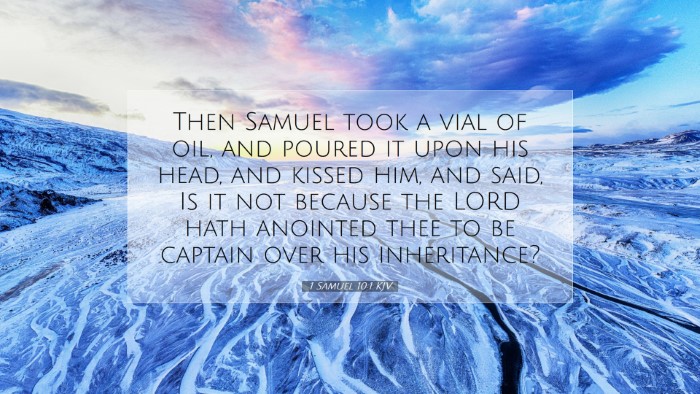Commentary on 1 Samuel 10:1
Verse Reference: 1 Samuel 10:1 – "Then Samuel took a vial of oil, and poured it upon his head, and kissed him, and said, Is it not because the Lord hath anointed thee to be captain over his inheritance?"
Introduction
This pivotal moment in 1 Samuel 10:1 marks the anointing of Saul as Israel’s first king. It is a transformative event that initiates a new phase in Israel’s history, moving from a theocratic system led by judges to a monarchy. The verse carries deep theological significance and sets the stage for understanding the nature of leadership and divine appointment.
Anointing and Leadership
Significance of Anointing: The act of anointing with oil serves as a ceremonial declaration that God has chosen Saul for His purposes. Albert Barnes emphasizes that anointing signifies the granting of divine authority and blessing. The oil, a representation of the Holy Spirit, indicates that Saul is to be empowered for the responsibilities of leadership.
- The Role of Samuel: Samuel acts as God’s mediator in this process. As a prophet and priest, his authority underscores the divine nature of Saul's appointment.
- Kissing as a Sign of Affection and Loyalty: The kiss signifies not only Samuel’s personal affection for Saul but also an acknowledgment of Saul’s new role as the leader of God’s people. Matthew Henry notes that this act demonstrates the bond between the anointed leader and God’s prophet.
Divine Appointment
Theological Implications: The phrase "the Lord hath anointed thee" indicates that Saul's kingship is underpinned by God’s authority. Adam Clarke draws attention to the necessity of divine appointments in leadership, stating that without God’s blessing, no authority can be sustained. This highlights the necessity for leaders to seek God’s favor and guidance in their roles.
Contextual Analysis
Understanding the context of 1 Samuel is crucial for grasping the weight of this anointing. Israel had desired a king to lead them like other nations, reflecting their shift towards secular authority. The choice of Saul, a man from the tribe of Benjamin, whose stature made him appealing, was an answer to the people’s demand but also a test of their trust in God.
God’s Sovereignty
God’s Control in the Selection: Despite the human desire for a monarch, it is essential to recognize that God remains in control. The anointing is not just about Saul’s qualifications but emphasizes that even in the establishment of a monarchy, God is sovereign. Scholars like Matthew Henry assert that God’s plans often come through seemingly flawed human choices, yet His purposes prevail.
Theological Reflection
This anointing hints at the complexities of leadership and governance within God’s framework. It serves as a reminder for contemporary leaders that their authority comes not from human accolades but from divine selection and empowerment. Charles Spurgeon often reflects on the importance of being ‘God’s man’ in leadership roles, highlighting that true leaders should seek to align their hearts with God’s will.
Leadership Qualities
Character Formation: Saul's anointing sets a foundation for the discussion on the qualities necessary for effective leadership. The mixture of divine favor and human frailty is explored extensively in the commentaries.
- Humility: At this moment, Saul displays initial humility, which is a critical trait for any leader. As he experiences the weight of God's calling, a posture of humility positions him to seek divine wisdom.
- Obedience: Subsequent to his anointing, Saul is called to obey God’s commandments as a leader. This principle applies to all leaders, who are expected to lead by example and adhere to divine standards.
Consequences of Leadership
Success and Failure: The tension of leadership implications is starkly visible in Saul’s narrative. His anointing is a moment of great promise; however, the later chapters reveal a tragic decline prompted by disobedience and a departure from God’s purpose. This warns current leaders about the vulnerabilities and accountability that come with authority.
Conclusion
1 Samuel 10:1 is a profound verse in the biblical narrative, rich in theological depth and practical application. It serves as a reminder that leadership is not solely about human charisma or capability but is fundamentally rooted in divine calling and purpose. As both pastors and scholars reflect on this passage, they are encouraged to recognize the necessity of divine guidance, the importance of character formation, and the responsibilities that come with leadership in God’s kingdom.
Final Reflection: May Saul’s anointing inspire leaders today to seek God’s heart in their pursuits, to embrace humility, and to recognize the weight of their calling.


